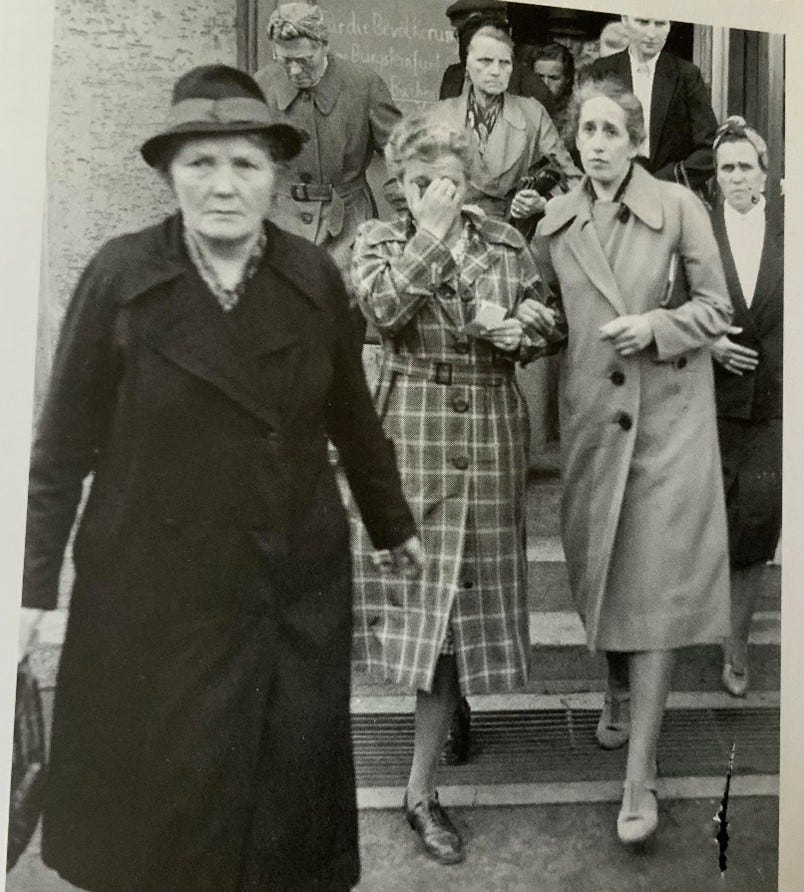The pathway of better understanding: global propaganda & the mass formation
Lessons from history and how to help reconnect our divided world.
Recently I’ve been revisiting and expanding my own knowledge into the role of propaganda in WW2 Germany and later in the Rwandan Genocide in 1994. These are dark subjects and demand some careful reflection.
What have I learned so far from my research about fear and propaganda in totalitarian societies? First of all, many people think that propaganda is in the past, that it doesn’t exist now, or when it does, they can easily spot it. In truth, when we study the stages of mass formation we can see how propagandising a population is a skillful, slow process. The German people knew exactly what was going on – they saw, developing over many years, the Jews and other ‘outgroups’ being - at first – vilified and bullied, later excluded from shops, libraries and wider society, harassed and segregated. Their assets and property confiscated. Their food rationed. But as Professor Crispin Miller explains in the Q&A of a lecture, for propaganda to be successful “it takes two to tango” - victims are complicit in their own downfall because they must want to believe it. Maybe that’s why it is so hard for us to admit we’ve been conned. It’s shameful.
Cleverly, it was this manipulation of the German people (mainly through their captured newspapers) which led to they, themselves enforcing those discriminatory policies, like ‘snitching’ on each other. Then they witnessed the Jews being herded onto trains, going to… they knew where. But most educated Germans were victims of the propaganda, and those who were sceptical, self-censored those conversations. The Jews too, they far outnumbered the Nazis, but many complied with initial instructions out of fear and cognitive dissonance: “Don’t be ridiculous!” Many of them must have said “Our Government wouldn’t do us harm!” (trying to convince themselves that all the rumours were just ‘fake news’). “They aren’t evil, they’re just protecting us”. But the Nazis were/are evil. And no Superman was coming to save them, they could only save themselves.
The villagers around Dachau knew what that acrid smoke was, emitted daily from the sinister chimneys. Some of them even did chores for the Nazis or drove the buses of disabled children into the camps: “for the greater good”. The German nurses carried out the unethical instructions of their doctors without question – knowing they were murdering innocent patients.
Was it ‘willful blindness’? Were they all psychopaths? Or was there something else happening here? But still no-one talked about it – this was too evil to allow your brain to even consider the possibility, let alone speak aloud – it was an uncomfortable truth. Even the researcher of this horror documentary, Honorary Professor, Faculty of Medicine, at the University of Queensland, Linda Shields, apparently can’t see the parallels with the covid era propaganda. As
points out today, the cognitive dissonance is just unbelievable:Like the covid propaganda, in Germany the media repeated the political narrative creating the illusion of consensus: ‘the final solution was for the greater good’ and this ‘disgusting, disease-carrying outgroup’ were ‘sub-human’ (or in Rwanda, ‘cockroaches’) and must be ‘eradicated’. Including those who did not comply.
For being ‘Good Germans’, complying with the in-group, self-censoring and ‘doing their duty’ they were praised by those in positions of power, made to feel special and awarded ‘allowances’ in rations and promotions at work. Sound familiar?
When the camps were liberated in 1945, one German village (Burgsteinfurt) was known as the ‘Village of Hate’ because of the residents’ stubborn resentment towards what they considered ‘fake news’. The Allied Forces showed documentary footage of the Bergen-Belsen death camps in the cinemas, but no-one attended. Eventually, British officers forced all 4,000 residents to go and watch the film…
Above is an image (taken from this book) of some residents as they left the cinema. Study their faces: the hideous reality of the crimes to which they had been complicit, finally dawned on them. The fear that had kept them compliant finally exposed by the truth.
Fear can be strangely addictive – in a paradoxical and cyclical way. During the covid era, many people felt a strange compulsion to obsessively tune into their home country’s daily ‘updates’ to be presented with that red banner below a podium with a speaker claiming the latest flawed data of ‘cases’ and ‘deaths’. Alongside this was an announcement of whatever laws had changed (overnight and without proper process or consensus) because of the ‘emergency powers’. Famously, here in NZ, WEF-YGL darling Jacinda Ardern proudly claimed she was apparently our ‘single source of truth’ and no one was to look at any other information. The Government-funded media didn’t question that, neither did many of my fellow citizens.
It was when I witnessed the same script being repeated by different countries’ leaders (Trudeau, Boris, Albo etc) that I realised something ‘smelled off’. At that time even I didn’t realise how intense the censorship was, until I was suddenly banned from Linkedin (30 years of professional connections, evaporated) for sharing the important BMJ article about the Pfizer’s whistleblower. Many of my colleagues were banned too. As
points out, rather than ‘episodes’ of propaganda during the run-up to war, this new era is continuous, all-pervasive military-style propaganda and silencing of dissent.If fear is addictive, it’s important to address that addiction - but how? It's a common misconception that the opposite of addiction is sobriety, to get away, cut (it) out, escape. But research confirms how the opposite of addiction is connection. Once we are away from fear and anxiety, we can become authentically connected, creative and resilient. These are the unique human characteristics that hold solutions to our current problems - so let’s help each other re-connect. New opportunities open-up when we are away from the influence of fear and coercive powers. It’s like putting on a new pair of glasses: we see so clearly!

We need courage to start these difficult conversations, so use these strategies and try not to be too emotional or judgemental ( I know, it’s hard!). Keep in mind the the well-established propaganda strategies:
· Use fear - Traumatise
· Tell a BIG lie
· Tell it first, repeat it often
· Exploit trust in authority
More and more of these kinds of authentic conversations are happening all over the world. People are coming together to learn about propaganda and to help put the pieces of the jigsaw puzzle together, in peace and grief and with HOPE for a new future. Don’t give up! Stay strong!







